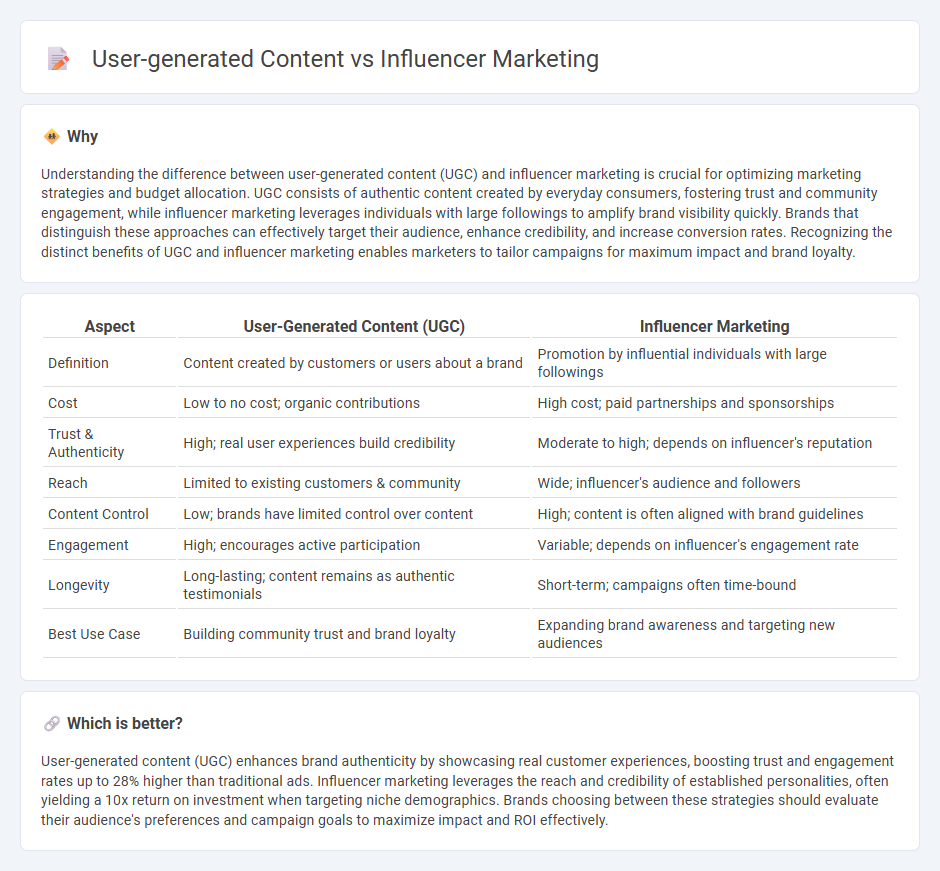
User-generated content leverages authentic customer experiences and peer recommendations to enhance brand trust and engagement, often resulting in higher conversion rates at a lower cost. Influencer marketing utilizes individuals with established audiences and credibility to amplify brand messages, targeting specific demographics for greater reach and impact. Discover more strategies to maximize your marketing efforts with these powerful tools.
Why it is important
Understanding the difference between user-generated content (UGC) and influencer marketing is crucial for optimizing marketing strategies and budget allocation. UGC consists of authentic content created by everyday consumers, fostering trust and community engagement, while influencer marketing leverages individuals with large followings to amplify brand visibility quickly. Brands that distinguish these approaches can effectively target their audience, enhance credibility, and increase conversion rates. Recognizing the distinct benefits of UGC and influencer marketing enables marketers to tailor campaigns for maximum impact and brand loyalty.
Comparison Table
| Aspect | User-Generated Content (UGC) | Influencer Marketing |
|---|---|---|
| Definition | Content created by customers or users about a brand | Promotion by influential individuals with large followings |
| Cost | Low to no cost; organic contributions | High cost; paid partnerships and sponsorships |
| Trust & Authenticity | High; real user experiences build credibility | Moderate to high; depends on influencer's reputation |
| Reach | Limited to existing customers & community | Wide; influencer's audience and followers |
| Content Control | Low; brands have limited control over content | High; content is often aligned with brand guidelines |
| Engagement | High; encourages active participation | Variable; depends on influencer's engagement rate |
| Longevity | Long-lasting; content remains as authentic testimonials | Short-term; campaigns often time-bound |
| Best Use Case | Building community trust and brand loyalty | Expanding brand awareness and targeting new audiences |
Which is better?
User-generated content (UGC) enhances brand authenticity by showcasing real customer experiences, boosting trust and engagement rates up to 28% higher than traditional ads. Influencer marketing leverages the reach and credibility of established personalities, often yielding a 10x return on investment when targeting niche demographics. Brands choosing between these strategies should evaluate their audience's preferences and campaign goals to maximize impact and ROI effectively.
Connection
User-generated content (UGC) and influencer marketing intersect by leveraging authentic consumer experiences to enhance brand credibility and engagement. Influencers often create or inspire UGC, which amplifies brand visibility through genuine testimonials and social proof across social media platforms. This symbiotic relationship boosts marketing ROI by fostering trust and driving conversions organically.
Key Terms
**Influencer Marketing:**
Influencer marketing leverages the reach and credibility of individuals with substantial social media followings to promote brands and products, driving higher engagement and targeted audience interaction. This strategy often results in measurable ROI through authentic endorsements and tailored content that resonates with niche communities. Discover how influencer marketing can amplify your brand's visibility and conversion rates effectively.
Sponsored Posts
Sponsored posts in influencer marketing leverage paid partnerships where brands collaborate with influencers to create targeted content that reaches specific demographics, enhancing brand visibility and engagement. User-generated content (UGC), on the other hand, encompasses unpaid, authentic posts created by consumers that build trust and foster community around a brand. Explore more insights on how sponsored posts and UGC can complement each other for effective digital marketing strategies.
Brand Ambassador
Brand Ambassador programs leverage influencer marketing by partnering with trusted individuals who authentically promote brand values, fostering deeper customer loyalty compared to one-time influencer campaigns. Unlike user-generated content (UGC), which relies on organic posts from customers, brand ambassadors provide consistent, strategic messaging that enhances brand reputation and drives sustained engagement. Explore how integrating brand ambassadors can transform your marketing strategy and amplify brand trust.
Source and External Links
Influencer marketing - Influencer marketing is a social media marketing strategy involving endorsements and product placements by individuals with expert knowledge or social influence to affect buying habits, primarily on platforms like Instagram, YouTube, Snapchat, TikTok, often focusing on authenticity and transparency issues.
What Is Influencer Marketing? - Influencer marketing enables businesses to collaborate with individuals who have followers to increase brand exposure, requiring clear goals, understanding the target audience, and budgeting for collaborations ranging from nano to celebrity influencers.
All You Need to Know to Plan, Execute, and Generate ROI - Influencer marketing consists of working with professional influencers to publicly endorse brands, aiming to boost business by expanding reach, building trust, and carefully planning campaigns that maximize return on investment across varying social platforms.
 dowidth.com
dowidth.com